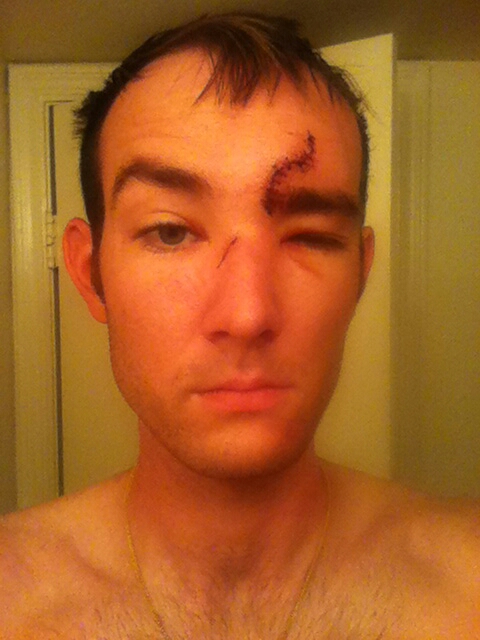Attorney Piccuta of Scottsdale Injury Lawyers Beats Defense Motions Asking Court to End Police Excessive Force Case
Attorney Piccuta of Scottsdale Injury Lawyers Beats Defense Motions Asking Court to End Police Excessive Force Case
On March 13, 2019, lead personal injury attorney, Tony Piccuta, obtained a victory in an Arizona civil rights case filed in federal court. The civil rights case alleges police excessive force against a Maricopa County Sherriff Deputy under 42 U.S.C. § 1983. Specifically, Piccuta obtained an order from the Court denying the motions of two separate defendants to end the case against them.
Immediately taking to the ground and seriously injuring a suspect who was not resisting or posing a threat, without warning, and without first attempting a less violent means violated clearly established Fourth Amendment Rights.
Motions for Summary Judgment in Police Excessive Force Cases
The motions that Piccuta defeated were motions for summary judgment. A motion for summary judgment may be filed under Federal Rule of Civil Procedure 56. The standard for the motion is that judgment should be entered in favor of the moving party if there is no genuine dispute as to any material fact. In other words, there is no factual dispute for a jury or court to decide and based on the undisputed facts one party should prevail as a matter of law.
Motions for summary judgment are routinely filed by defendants in police excessive force cases. These motions may be brought for a number of reasons and to eliminate a number of claims. Typically, they are filed by defendants with the hope that they will end all the claims a plaintiff or injured party has. If a defendant is successful in doing so, the case is over for the plaintiff or injured party and they receive nothing. Needless to say, these motions can be devastating to a plaintiff or injured party as the motions are usually brought late in a case and after the case has been pending for several years.
Using 42 U.S.C. § 1983 To Assert Civil Rights Claims Against Police Officers
42 U.S.C. § 1983 is a federal statute that allows a person to sue local government agencies, employees and agents for a violation of his or her federal constitutional rights. This statute is commonly used to sue local law enforcement for the violation of a person’s rights arising under the amendments to the United States Constitution. For example, this allows an Arizona resident to sue local police officers, state patrol officers, county sheriff deputies and other city and county officials for any such violations. This includes violations of the:
- First Amendment (right to free speech)
- Fourth Amendment (right to be free from unlawful search and seizure, unlawful arrest and excessive force);
- Fifth Amendment (right to due process of law);
- Eighth Amendment (right to be free from cruel and unusual punishment)
- Fourteenth Amendment (right to equal protection under the law)
However, when a person sues a local government actor, agent or employee (including police officers and other law enforcement), under 42 U.S.C. § 1983, those individuals can raise the defense of qualified immunity. This defense is routinely raised by motions for summary judgment in police excessive force cases.
The Qualified Immunity Defense in Police Brutality Lawsuits
Government officials are entitled to qualified immunity from civil damages unless their conduct violates “clearly established statutory or constitutional rights of which a reasonable person would have known.” Harlow v. Fitzgerald, 457 U.S. 800, 818 (1982). In non-legal terms, this simply means that it must be obvious that the act violated a constitutional right or there must be a legal case (precedent) setting forth the same.
With respect to police excessive force cases, the analysis is usually fact specific. The analysis focuses on whether or not it should have been clear to the offending officer that what he did violated a known constitutional right. In other words, would a reasonable officer in the offending officer’s position known that the acts committed were unlawful. If there is a controlling case based on a very similar or the exact same fact pattern stating so, then the officer is not entitled to qualified immunity.
Details of the Civil Rights Lawsuit in Which We Recently Prevailed

The case that Piccuta recently prevailed in, involved his client who was at Main Event restaurant in Tempe, Arizona. The Main Event restaurant is entertainment themed and has bowling, billiards, arcade games, laser tag, among other activities. The client was allegedly rowdy during a game of laser tag and the decision was made by the restaurant’s management to have the client leave.
The restaurant employed a Maricopa Sherriff’s deputy who worked in uniform performing “off-duty” security for the restaurant. The deputy was ordered to remove the client from the restaurant. However, in doing so, the deputy took down the client slamming his face and head onto the hard floor. The client alleges that no warning was given and that he did not take any action to justify the take down. The client sustained a head injury resulting in permanent cognitive defects and a gash on his forehead requiring twenty stitches and leaving a permanent scar. The case is pending in the United States District court of Arizona and is entitled Higgins v. Laterza, Et al. (Case # 2:16-CV-03943).

The lawsuit asserted claims against the Maricopa County Sheriff deputy for police excessive force in violation of the client’s Fourth Amendment rights. It also asserted claims against the Main Event restaurant for its participation and facilitation of the wrongful acts. Both the restaurant and Sheriff’s deputy were represented by different attorneys. Both the restaurant and deputy filed motions for summary judgment.
The motion filed by the deputy argued that he should be entitled to qualified immunity. Specifically, the deputy argued that “it was not clearly established that a takedown of an unresisting arrestee violated the Fourth Amendment.” Essentially, the deputy, through his Maricopa County attorney, argued that officers can throw people to the ground for no reason and even when they are not resisting arrest because there is no case saying it would be a violation to do so.
The Ruling by the Court In the Excessive Force Lawsuit Against the Sheriff Deputy
The court cited to two cases in reaching its decision to deny the deputy qualified immunity. The first was Blakenhorn v. City of Orange, 485 F.3d 463 (9th Circuit 2007). In that case, the Court held that “gang-tackling without first attempting a less violent means of arresting a relatively calm trespass suspect—especially one who had been cooperative in the past and was at the moment not actively resisting arrest—was a violation of that person’s Fourth Amendment rights.” The court also cited to the case of Santos v. Gates, 287 F.3d 846, 853-54 (9th Circuit 2002). In that case it was held that officers used excessive force by using a takedown that resulted in a broken back, when the crime was public intoxication and the suspect neither fled or resisted arrest.
The court cited to two cases in reaching its decision to deny the deputy qualified immunity. The first was Blakenhorn v. City of Orange, 485 F.3d 463 (9th Circuit 2007). In that case, the Court held that “gang-tackling without first attempting a less violent means of arresting a relatively calm trespass suspect—especially one who had been cooperative in the past and was at the moment not actively resisting arrest—was a violation of that person’s Fourth Amendment rights.” The court also cited to the case of Santos v. Gates, 287 F.3d 846, 853-54 (9th Circuit 2002). In that case it was held that officers used excessive force by using a takedown that resulted in a broken back, when the crime was public intoxication and the suspect neither fled or resisted arrest.
The court’s order in the case handled by Piccuta stated:
“Accepting Plaintiff’s facts as true, it was clearly established that immediately taking to the ground and seriously injuring a suspect who was not resisting or posing a threat, without warning, and without first attempting a less violent means violated clearly established Fourth Amendment Rights. Accordingly, the Court will deny summary judgment to Laterza on the basis of qualified immunity.”
Click the below link to read a copy of the Court’s order.
The case will now continue to trial on the client’s claims of excessive force against the deputy in violation of the Fourth Amendment. The case will also proceed to trial against Main Event on the client’s claim that the restaurant is responsible for the assault and battery committed by the deputy. However, before the trial commences, the parties will attend a settlement conference with Judge Michelle Burns on May 20, 2019. At the conference it will be determined if a fair resolution will be reached and the case settled. If not, Piccuta will be ready to try the case and seek full justice for his injured client.
Contact One of Our Scottsdale Civil Rights Attorneys to Discuss Your Case
If you or a loved one has a civil rights claim for the misconduct of a law enforcement officer, contact Scottsdale Injury Lawyers today. We have experience handling and winning civil rights cases involving: excessive force, false arrest, wrongful search and seizure, first amendment retaliation, false imprisonment, police brutality, among other claims. A skilled civil rights attorney is available now to discuss your case and provide a free consultation.
About the author: The content on this page was written by Scottsdale civil rights lawyer and personal injury attorney Tony Piccuta. Piccuta graduated with honors from Indiana University-Maurer School of Law in Bloomington, Indiana (Ranked Top 35 US News & World Report 2018). Piccuta took and passed the State bars of Arizona, California, Illinois and Nevada (all on the first try). He actively practices throughout Arizona and California. He is a trial attorney that regularly handles serious personal injury cases and civil rights lawsuits. He has obtained six and seven figure verdicts in both state and federal court. He has been recognized by Super Lawyers for six years straight. He is a member of the Arizona Association of Justice, Maricopa County Bar Association, Scottsdale Bar Association, American Association for Justice, National Police Accountability Project and Consumer Attorneys of California, among other organizations.
Disclaimer: The information on this web site is for informational purposes only and does not constitute legal advice. Reading and relying upon the content on this page does not create an attorney-client relationship. If you are seeking legal advice, you should contact our law firm for a free consultation and to discuss your specific case and issues.
Sources:
[1] https://www.law.cornell.edu/rules/frcp/rule_56

